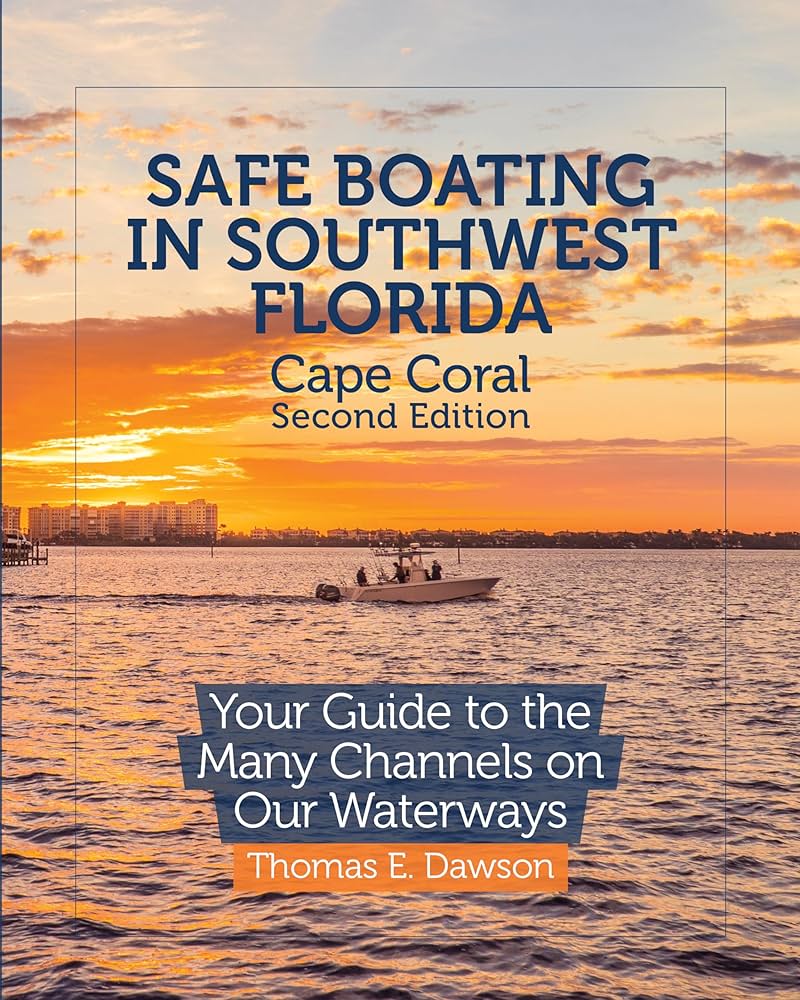
Understanding the New Florida Freedom Boater Law
Since July 1, a new Florida Freedom Boater law has been in effect, asking boat owners to complete a “Vessel Safety Equipment Attestation” when registering, renewing, or transferring a vessel. This legislation is designed to ensure that every boat on state and federal waters is equipped with safety equipment that meets United States Coast Guard requirements. While the law might seem overwhelming at first, many local organizations, such as the Cape Coral Sail and Power Squadron, are ready to help boaters figure a path through its tricky parts.
The new procedure is straightforward: upon initiating a registration or renewal, boat owners must confirm two main statements. The first statement assures that their vessel carries all of the necessary safety equipment for legal operation. The second acknowledges the owner’s responsibility to comply with all applicable maritime safety rules and regulations—a legal duty that can appear nerve-racking if you’re not completely familiar with the local and federal requirements.
Safety Equipment Essentials for Successful Boating
Boating safety is super important for anyone who enjoys riding the waves or exploring inland waters. The law clearly mandates that vessels possess all required safety gear as specified by the United States Coast Guard and enforced by applicable federal regulations. For many boaters, keeping track of which items might need regular replacement or inspection is challenging, but organizations like Cape Coral Sail and Power Squadron encourage regular (annual) free Vessel Safety Checks to tackle any tangled issues before they become a problem.
Below is a handy list of common safety equipment that boat owners should check:
- Life jackets and personal flotation devices (PFDs)
- Fire extinguishers
- Navigation and signaling lights
- Sound-producing devices (such as horns or whistles)
- Visual distress signals
- Emergency flares and first aid kits
By ensuring that each piece of equipment is up-to-date and in good condition, boat owners can go a long way in avoiding the nerve-racking realities of boating accidents and being pulled into complicated legal disputes.
Steps to Comply with the Florida Law
Adhering to this new regulatory framework doesn’t have to be a confusing or overwhelming experience. In fact, the process has been streamlined to benefit the boating community. Here’s a closer look at the steps involved:
- Complete the Vessel Safety Equipment Attestation: When you register, renew, or transfer ownership of your boat, fill out the form that verifies all safety equipment is in place. This step is essential and lays the groundwork for legal operation.
- Obtain a Free Vessel Safety Check: Unsure if your boat meets safety standards? Book a free check with a vessel examiner from a local organization who keeps up to date on the recent changes. This check helps pinpoint any missing items or signposts pieces that are nearing expiration.
- Enroll in Boating Safety Education Courses: Boating rules, from national to local, can sometimes be full of problems and tricky parts. Taking a course gives you the confidence to navigate through these issues, keeping you well-informed and prepared.
- Schedule Regular Maintenance: Safety isn’t a one-time task. Regular annual inspections help you catch those little details (like expiration dates and wear-and-tear issues) that could later prove to be problematic.
Each of these steps is not only an administrative requirement but also an opportunity to reinforce safe boating practices. The free services provided by local organizations help ensure that boaters aren’t left to figure a path through these requirements on their own.
Boating Safety Education Courses: Free Resources for Every Boater
Understanding all the subtle parts of maritime safety laws might initially seem intimidating, but several courses and seminars are available to assist. One standout option is the United States Power Squadron’s “America’s Boating Course”, which has been designed to cover all federal, state, and local rules. These courses are approved by Florida authorities and are a must-have for anyone wanting to steer through the shifting legal waters.
Boating education courses not only provide vital information about required safety equipment but also offer insights into the proper response during an emergency. In addition to basic safety training, these classes often cover:
- The small distinctions between coast and inland navigation rules
- Proper usage of distress signals and life-saving techniques
- Guidance on how to keep your boat in top shape
- Step-by-step advice for dealing with unexpected complications
By engaging in these classes, boaters learn to appreciate the importance of ongoing education. Many find that the courses reveal fine shades of regulatory procedures that were previously hidden, turning what was once considered a full-of-problems area into a well-managed system.
Why a Free Vessel Safety Check is Essential
A free Vessel Safety Check isn’t just a convenient service—it’s a vital component in the overall boating safety effort. With safety equipment on boats subject to wear and expiration, getting a professional inspection has never been more critical.
These checks often provide:
- A clear inventory of safety gear, with details on which items meet the latest standards
- Recommendations on equipment maintenance and replacement
- Detailed evaluations from experienced vessel examiners who understand both federal and local requirements
By routinely checking your vessel, you avoid those scary, overwhelming moments when a piece of equipment suddenly fails you. It’s a proactive step that pays off in emergencies, ensuring that you’re always ready to make your way through any challenging situation that might arise on the water.
Managing Your Way Through Boater Regulations
The regulatory framework that governs boating isn’t without its twists and turns. From federal mandates to local stipulations, the rules can seem scattered and full of problems if you’re not prepared. Yet, with the support of local agencies and incremental check-ups, managing your boat’s compliance becomes a more approachable task.
Boaters must understand that these regulations, although they may seem complicated at times, are there to ensure that each trip on the water is as safe as possible. By acknowledging and accepting the responsibility of following these rules, you are making a commitment not just to legal safety, but to the well-being of all who share the water.
Local Resources and Community Support for Boaters
For those who find themselves a bit on edge when it comes to meeting all the legal and safety requirements, the local community is an invaluable resource. Organizations like the Cape Coral Sail and Power Squadron offer everything from free safety equipment checks to informative boating classes.
Local volunteer staff members are always eager to answer questions and provide guidance. They can help you:
- Understand the small distinctions between inland and coastal boating regulations
- Figure a path through the registration and attestation process
- Schedule and perform routine safety equipment inspections
- Keep up to date with any new changes in federal and local boating laws
This community support makes a significant difference. Instead of facing intimidating procedures alone, many boater organizations extend a helping hand, ensuring that everyone on the water enjoys the necessary safety measures.
Comparing Inland and International Boating Rules
One of the subtle details that many boaters need to be aware of is the distinction between inland and international (or coastal) boating rules. These differences can sometimes feel confusing, especially for those who frequent both types of waterways. To make this clearer, here is a table comparing key aspects:
| Aspect | Inland Waterway Rules | International/Coastal Rules |
|---|---|---|
| Start/End of Rules | Applies within designated inland limits | Begins once you cross the “Line of Demarcation” into the Gulf or open sea |
| Speed Limits | Varies by local regulations and waterway type | Generally more strict and enforced by federal guidelines |
| Communication Distress Signals | Basic verbal and visual signals usually suffice | May require more advanced equipment and protocols |
| Licensing Requirements | Often less stringent; local education may be enough | Requires national certification or approved courses |
Understanding these little twists in the rules is critical for safe navigation between different water types. If you’re ever unsure which set of rules applies, a quick consultation with local experts can help clear up any tangled issues.
Learning Through Local Boating Seminars
For many boat owners, the idea of dealing with all these regulations can be nerve-racking and full of problems. Fortunately, local seminars and workshops are available to help you get into the nitty-gritty of the rules in a relaxed, community-focused environment. For instance, the two-hour seminar “Rules of the Road” offers an in-depth look at both inland and international rules, clarifying the small distinctions and subtle details that often trip people up.
Seminars typically cover:
- Practical demonstrations of safety equipment usage
- Interactive sessions on emergency procedures
- Case studies of common mishaps and how to avoid them
- Step-by-step guidance on completing the Vessel Safety Equipment Attestation form
These sessions also give boaters a chance to ask questions and polish up on aspects that they might have found intimidating when reading through lengthy regulations on their own.
Opportunities to Expand Your Boating Knowledge
Regular updates and refresher courses are a key part of maintaining a safe boating environment. With classes resuming in September, many local organizations have ramped up their educational offerings. Whether you are a seasoned boater or new to the scene, the chance to dig into topics like safety regulation changes and equipment maintenance is invaluable.
Not only do these courses offer structured learning, but they also frequently provide:
- Flexible scheduling options to suit busy lifestyles
- In-depth discussions of federal and local regulations
- Access to community resources including charts, local guides, and expert recommendations
- An open forum for discussing the twists and turns of boat maintenance and safety checks
The practical advice and hands-on demos from these classes can deeply enhance your confidence when preparing your vessel for both leisurely outings and longer boating trips.
Essential Tips for New and Seasoned Boat Owners
As boat safety regulations grow more detailed, it becomes even more important for all boaters to keep on top of maintenance and regulatory requirements. Whether you’re a first-time owner or a long-time enthusiast, these tips can help you work through any confusing bits:
- Plan Regular Inspections: Schedule your free Vessel Safety Check at least once a year to catch any issues before they become full-of-problems.
- Enroll in Ongoing Courses: Sign up for refresher courses and seminars to stay current with the latest regulatory changes.
- Keep a Detailed Log: Maintain a record of your inspections, maintenance, and any updates made to your vessel’s safety equipment.
- Engage with the Community: Often, local volunteer groups have a wealth of experience. Don’t hesitate to ask for help and advice.
- Review Regulations Regularly: Bookmarks and printouts of federal and state rules can help keep the fine points accessible whenever you need to review them.
By managing your boat’s upkeep and staying engaged with educational resources, you ensure that every outing is as safe as possible and that you are well-prepared to handle any unexpected complications.
Community Success Stories and Positive Outcomes
Many local boating communities have already seen positive changes as a result of adhering to the new Florida Freedom Boater law. Boaters report fewer unexpected issues during inspections and feel more confident on the water knowing that they have addressed all the nerve-wracking aspects of safety compliance.
Noteworthy success stories include:
- Smooth Renewals: Several boat owners reported that the registration process became much smoother after completing the safety attestation and booking a free Vessel Safety Check.
- Enhanced Community Trust: With local organizations taking the lead to educate and inspect vessels, community trust has grown, and boaters are more willing to share best practices.
- Less Stress on the Water: Knowing that your vessel has met all safety standards means that every boating trip becomes a more relaxing experience.
These stories are a testament to the fact that although the law may initially seem intimidating, the benefits of compliance ripple across the entire boating community.
The Future of Boating Safety and Regulation in Florida
Looking forward, it’s clear that the evolution of boating regulations in Florida will continue to provide both challenges and opportunities. As technology advances and standards evolve, the boating industry must be ready to adapt to new safety requirements that might at first seem full of tangled issues. However, with a proactive approach, supported by community education and regular inspections, boaters can confidently face the future.
The emphasis on educational initiatives and community-based inspections is expected to become even more critical in the coming years. Future legislative changes may further clarify certain confusing bits or add new requirements meant to ensure that every vessel remains safe under any circumstances. The key is to remain flexible, informed, and engaged with the resources available through your local boating organizations.
Taking the Wheel: Your Role in Enhancing Boating Safety
Ultimately, taking responsibility for your vessel’s safety is not just a legal duty—it’s a commitment to protecting yourself, your passengers, and other water users. Every boat owner must recognize that the process of ensuring safety isn’t static; it requires continual education, regular checks, and a proactive stance in addressing even the small distinctions within the myriad regulations.
Here are some final steps to help you take the wheel when it comes to boating safety:
- Be Proactive: Rather than waiting for an issue to arise, schedule periodic checks and stay informed about the latest regulatory updates.
- Engage with Experts: Local vessel examiners and boating organizations are invaluable when it comes to understanding and implementing safety measures.
- Keep Learning: Boating safety isn’t a one-time lesson. Sign up for classes, participate in seminars, and join community forums to share experiences.
- Document Your Compliance: Maintain records of safety inspections, training certifications, and any maintenance activities. This documentation can be critical in case of legal reviews or future regulatory changes.
By consistently taking the time to dig into new regulations and keep pace with evolving safety standards, you ensure that boating remains a safe and enjoyable activity for everyone.
Final Thoughts on Embracing Change and Ensuring Safety
The recent implementation of the Florida Freedom Boater law marks a significant step forward in enhancing maritime safety. Although the process of completing safety attestations, taking classes, and scheduling free checks might seem intimidating at first, embracing these changes generates long-term benefits for the entire boating community.
With a network of supportive local organizations ready to offer guidance, as well as a range of educational resources and community seminars, boaters are well-equipped to manage their way through any tricky parts or tangled issues. Safety isn’t just a requirement—it’s an ongoing commitment to ensuring that every journey on the water unfolds without mishaps.
As we continue to take a closer look at the evolving regulations and incorporate advancements in safety measures, it’s clear that the future of boating in Florida is not only secure but also bright with opportunities for education and community engagement. Whether you’re a veteran boater or just starting out, the collective efforts of local agencies and dedicated training programs ensure that each trip is as safe as it is enjoyable.
Conclusion: Steering Toward a Safer Boating Future
In conclusion, the new Florida Freedom Boater law represents more than just another regulatory hurdle—it is a clear signal that safety on the water is paramount. By taking advantage of the free Vessel Safety Checks, enrolling in comprehensive boating courses, and engaging with local community resources, boaters can effectively settle any nerve-wracking questions and complicated pieces within the safety framework.
This opinion editorial has aimed to unpick the tangled issues associated with the new law, offering clear steps and insightful tips on how to work through the required procedures. From understanding the detailed safety equipment requirements to appreciating the benefits of community-led educational courses, the measures are all designed to give boat owners the confidence to make the best decisions for themselves and their passengers.
Ultimately, taking a proactive stance towards boating safety means ensuring that every voyage on Florida’s beautiful waters is not only legally compliant but also as enjoyable and stress-free as possible. By embracing the new law, regular safety checks, and ongoing education, we all contribute to creating a future where the water is a safe haven for adventure and joy.
With a commitment to continuous learning and the support of dedicated local organizations, boaters can look forward to a thriving maritime culture where every vessel is well-maintained, every journey is carefully planned, and the spirit of adventure is nurtured in a safe and welcoming environment.
Originally Post From https://www.capecoralbreeze.com/news/local-news/2025/08/05/cape-coral-sail-and-power-squadron-is-ready-to-help-boaters-prepare-for-the-florida-freedom-boater-decal/
Read more about this topic at
Required Safety Equipment
TPWD: Boating – Safety Tips – Texas.gov


